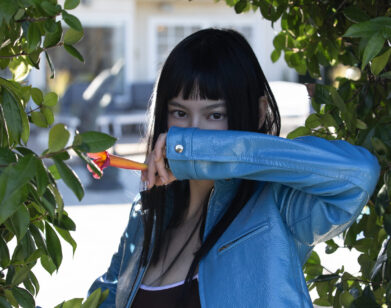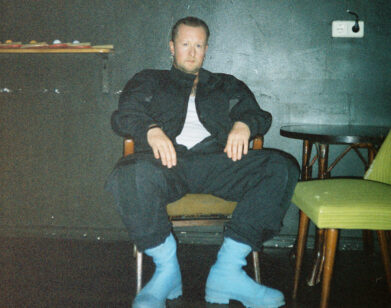Nite Jewel’s Forward-Looking Throwback Girl

ABOVE: RAMONA GONZALEZ. PHOTO COURTESY OF MATTHEW SCOTT
If only it were 1994, Ramona Gonzalez, the singer and songwriter of the Los Angeles band Nite Jewel, would be dominating the radio airwaves with her elegantly subdued ballads and smooth R&B-infused funk. Even the cover of the group’s new record, One Second of Love, consisting of a stark head-on portrait of Gonzalez shot from the belly button up, recalls the heyday of smooth mid-tempo pop (see: Janet Jackson’s Janet, Madonna’s Bedtime Stories for reference). Full of featherlight drum-machine sounds, fluttering synthesizers and light-hearted bass, the EP is an eclectic mix of soaring melodies, scattered disco undertones and slow, meditative songs, mostly in minor keys, often pondering abandoned romance and warbling nostalgia. And just in case it seemed that perhaps Gonzalez was weary of truly letting her hair down on the dance floor, catch this exclusive pounding remix of “Memory, Man” by Jorge Elbrecht of the new-wave outfit Violens.

ALEX HAWGOOD: Ten years ago, we met when we were both freshmen in college in New York. We lost touch after you dropped out of school and now, lo and behold, you sing in a band. Fill me in, please.
RAMONA GONZALEZ: Sure! [laughs] Well, you met me when I was going to Barnard. I dropped out for a year to try and figure things out. While I was away from school, I met Cole [Cole Marsden Greif-Neill, Gonzalez’s husband and Nite Jewel’s producer]. He was this really inspiring, weird guy who was this music freak, you know? We instantly fell in love at first sight. It’s cheesy, I know, but it just sort of happened. I broke up with my boyfriend 24 hours after I met Cole for the first time. Next thing you know, we moved in together. And shortly after that, we both decided we didn’t want to be in school anymore and that we would rather make music and play in bands. Flash forward a couple years, and we moved to Los Angeles and that’s when I started recording as Nite Jewel.
HAWGOOD: Good Evening was your first LP, but in many ways this new record feels like a coming out of sorts.
GONZALEZ: Totally. I self-released my first LP. If this were any other time in history, One Second of Love would be my first LP, but because of the easy dissemination of information that is nowadays I was able to release Good Evening to the masses in a very underground way, mostly through word of mouth through MySpace.
HAWGOOD: How did the recording process for One Second of Love differ from Good Evening?
GONZALEZ: This record is much more robust and articulate, I think. It was recorded in thirds, sort of. The first third of the record began in a studio in North California. They were based on improvisational structures that Cole and I would perform together while our friends just recorded the music. Another third of the record, songs like “Mind & Eyes” and “She’s Always Watching You,” were recorded in my house in LA on my own. And then there were a few songs that were recorded in Topanga.
HAWGOOD: How did these different recording processes affect the type of songs you made?
GONZALEZ: “Mind & Eyes” is an ode to soft rock, in a way. When I was recording it, I was really into these songs that were lounge-y, lovelorn and depressing. I kept thinking bout “Deacon Blues” by Steely Dan. “In The Dark” was recorded completely in our house in Topanga, because the song has more of an intimate feel.
HAWGOOD: You had also told me that you had thinking a lot about R&B from the ‘90s, like Janet Jackson’s “Janet” album and Aaliyah. Musically, those artists are not exactly in the same vain as Steely Dan.
GONZALEZ: [laughs] Yeah, that’s true. I am a huge R&B junkie. That era in music is a big influence on me. I just made this ‘90s R&B mix for this website, and I got to use Spotify for the first time. It was amazing, because I was trying to collect ‘90s R&B tracks a few years ago and finding them to download was nearly impossible. I had been looking for random tracks from Jade, X-Scape and Total, because these were these tracks I totally grew up on. I listened to that music non-stop. These women were sensual and sexy, but really powerful African-American singers. I remember I would go to Target and fill up my shopping cart with tons of singles and albums or whatever. I was intensely inspired by these women. I wanted to be them. I would sing around my house and pray that some scout would walk by, hear me sing, and put me on some BET channel or something. It was definitely a fantasy of mine.
HAWGOOD: I recently stumbled across an unreleased edit of Total’s “Sitting Home” by Art Department that I am going to send you. Did you get the remix of Aaliyah I sent you?
GONZALEZ: Yes! Love it. I am very into remixes. Aaliyah is an artist that is remixed so much, so when you find a good one it’s always refreshing.
HAWGOOD: In some ways, your voice reminds me of hers. It’s very strong, but can also be very light. Another artist I was thinking about was Tracey Thorn, who does some of the same subtle, melancholic dance music that I think you also do so well. Are you familiar with her?
GONZALEZ: My friend Lauren introduced me to Everything But The Girl back in the day. I wasn’t so familiar with everything she had done, but as soon as I started being introduced to all of her music, I was hooked. When it comes to dance music, I think her voice brought this new vibe to the table—a type of understated, sexy androgyny, you know what I mean? And I think Aaliyah did a lot of that too. She wore these big coats and baggy jeans and she wasn’t trying to be overt with her sexuality. I really relate to women like that. It’s more understated, but more powerful. God, that’s what I hope to try and do, too.
HAWGOOD: I think the Violens remix of “Memory, Man” achieves this quite well. It’s somber, but danceable.
GONZALEZ: Yes, one hundred percent. It’s just what I was looking for. Jorge [Elbrecht] from Violens totally nailed it. For me, the ultimate thing is when melancholic female vocals are put into a complete dance-club context. “Memory, Man” is a record about yearning. It’s about nostalgia in music, nostalgia in your life, nostalgia for past times and trying to recontextualize nostalgia and transform it into something positive. That’s what “Memory, Man” is about. It’s really cool that Jorge transformed the vocals to make it this really anthemic, positive-feeling track. He couldn’t have done it any better.
HAWGOOD: I think many of the tracks from “One Second of Love” are made for remixing. They’re great as they are now, but you can so easily see how great they would be with an added 808 drum and faster BPM.
GONZALEZ: Yes, yes, yes! I want as many remixes as possible. Whoever wants to do it, I’m open. For my music, when I want it remixed I want it turned into a dance jam.
HAWGOOD: You start your tour with Chairlift at the end of the month. How’s that coming along?
GONZALEZ: I have my band together and they are fantastic, so now I am in the process of putting together my look and feel for the stage. I really like this slightly androgynous look—somewhere between elegant and easy. I don’t want to look like a fashion victim when I walk off stage, you know? It’s important to wear the right thing on stage. I really love the designer Suno. Their clothes seem perfect for me. They do a lot of interesting stuff with patterns, which is ideal for me so I don’t disappear in the background. I also love Rodarte. The clothes they make are feminine but forward-thinking.
HAWGOOD: It’s important to stay forward-thinking.
GONZALEZ: Yes, exactly! You know, a lot of people are wondering about why the new record feels more polished than anything else I’ve put out before. It’s funny, because that seems to be an issue for people. If people try to create music that is accessible, it is treated with a question mark. Like, what’s she up to? How did that happen? I think that’s the issue with the whole Lana del Rey phenomenon. If people intentionally try to create music that is accessible, than it is met with a little bit of suspicion. I never understand that. Growing up in the ‘90s, the music I listened to had this larger-than-life quality. I didn’t grow up with music where the vocals were obscured or intentionally lo-fi. Even Mary J. Blige, if you listen to a song like “Real Love,” you can hear that it was recorded in a box. It feels a little lo-fi. But you can tell that her and her team or whatever were trying to push so hard to make that record sound enormous. I think that I’ve always tried to do that from the start, but when I was recording my first record I didn’t have the same resources or skills. I mean, I am not a producer and I wasn’t very technically able, but people thought it was an integral part of my craft to be, like, muddled. When I was making my first record, I thought I was making a pop record. I didn’t think I was making anything particularly lo-fi. I was shocked when that was how it got labeled. In the end, my skills might be developing but my intentions have always been the same.
ONE SECOND OF LOVE IS OUT TODAY. FOR MORE ON NITE JEWEL, VISIT THE BAND’S WEBSITE.






